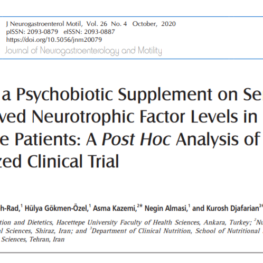
CEREBIOME® capacity to increase brain-derived neurotrophic factor levels translate from preclinical to clinical study
Published on 20/10/2020
A new post-hoc analysis confirmed in humans that CEREBIOME® can increase significantly BDNF serum levels as observed several years ago in preclinical models. These new results bring more understanding about the potential modes of action of CEREBIOME® on the gut-brain axis, especially on depressive population.
Previously, in 2018, Kazemi et al. followed 110 adults suffering from mild to moderate depression. They found out that CEREBIOME®, used as an adjunct therapy to conventional antidepressant treatment, had contributed to a significant reduction of Beck’s Depression Inventory (BDI) depression score from 18 down to 9 on average, and increased serotonin precursors after eight weeks of intake. These results are clinically significant, showing the patients were now categorized with “minimal depression” according to the validated assessment scale. More precisely, the CEREBIOME® group showed a decrease in the blood kynurenine/tryptophan ratio, which suggests that tryptophan was diverted toward the synthesis of serotonin (p<0.05) and away from the inflammatory pathway (p<0.05) compared to the placebo group.
Serum BDNF levels are lower in depressed patients and they increase after a long course of antidepressant treatment. In this new post-hoc analysis, the investigators looked at the participants’ BDNF serum levels. Results show that the probiotic formula CEREBIOME® significantly increased BDNF levels compared to the placebo group (p=0.02) and to the prebiotic group (p<0.001), which inversely correlated with depression severity compared to placebo (p=0.012).
“This is a great example where the clinical trial observations matched the observations from the preclinical studies,” explains Lucie Lingrand, specialist of the brain-gut axis at Lallemand Health Solutions. The increase of BDNF identified in animal model by Ait Belgnaoui in 2014, appeared to translate to humans. It may be one of the mechanisms of action by which CEREBIOME® reduces depression in humans, in addition to all the demonstrated modes of action to date”, details Lucie Lingrand.
To read the full post-hoc analysis, visit: http://www.jnmjournal.org/journal/view.html?doi=10.5056/jnm20079